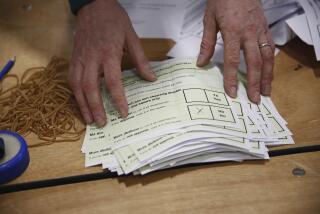Narrow Endorsement Removes Only Major Obstacle : Irish Parliament Ratifies Pact on Ulster
- Share via
DUBLIN, Ireland — After three days of intense debate, the Irish Parliament Thursday ratified the Anglo-Irish agreement aimed at promoting peace in Northern Ireland.
Prime Minister Garret FitzGerald won a narrow 88-75 endorsement for the historic accord he signed last week with his British counterpart, Margaret Thatcher.
Results of the vote, read to a packed house in Ireland’s native Gaelic language, removed the only significant obstacle to implementation of the agreement, which is expected to go into force after approval next week by the British Parliament, where it has the support of all major parties.
The agreement is the first formal attempt by the two countries to join forces in reducing the level of sectarian violence that has claimed more than 2,500 lives in Northern Ireland since 1968.
Consultative Role
The accord gives the Republic of Ireland a formal, consultative role in Northern Ireland for the first time ever but also requires Ireland to recognize British sovereignty there for the foreseeable future.
It was on the point of sovereignty that Irish opposition leader Charles Haughey centered his challenge to the accord. He contended that it violated the nation’s 1937 constitution, which claims Northern Ireland as part of the Republic.
“By voting against the government, we wish principally to oppose the fundamental change in the constitutional position this agreement brings,” Haughey’s deputy leader, Brian Lenihan, told Parliament before the vote.
Haughey’s Fianna Fail party also charged that the agreement gives the Republic responsibility without authority in Northern Ireland, also known as Ulster.
Public Support
However, broad-based public support in Ireland for the agreement brought pressure within Haughey’s party to ease opposition.
Under terms of the accord, Irish representatives to a joint Anglo-Irish council will be empowered to put forward views and proposals for policy in Northern Ireland, but all decision-making remains with Britain.
The aim of the accord is to boost the confidence of Ulster’s Roman Catholic minority community.
FitzGerald’s foreign minister, Peter Barry, underscored the government’s commitment to Irish unity but said such unity could only be achieved by consent.
In an apparent attempt to allay fears of Ulster’s Protestant majority, Barry stated categorically: “The Irish government has no designs on the North. We recognize the identity of the Unionists--their Britishness, their ethos, their sense of being threatened by Irish unity.”
Ulster Protestants, known as unionists because of their allegiance to the union with Britain, see the agreement as the first step toward Irish unity and the end of their way of life.
Huge Rally Planned
Unionist leaders in the Northern Ireland provincial capital of Belfast say they will try to bring 100,000 protesters into the streets Saturday in a rally to protest the agreement.
A small group of Protestant demonstrators, including a member of the provincial legislative assembly, physically attacked Britain’s secretary of state for Northern Ireland, Tom King, in Belfast on Wednesday.
Unionist leader Ian Paisley, whose supporters were involved in the attack on King, issued a veiled threat to Barry to stay away from the province: “If they bring Mr. Barry to Belfast, we won’t be responsible for what happens.”
Barry has been named as head of the Irish side of the Anglo-Irish council for the province, which is to meet in Belfast.
More to Read
Sign up for Essential California
The most important California stories and recommendations in your inbox every morning.
You may occasionally receive promotional content from the Los Angeles Times.













